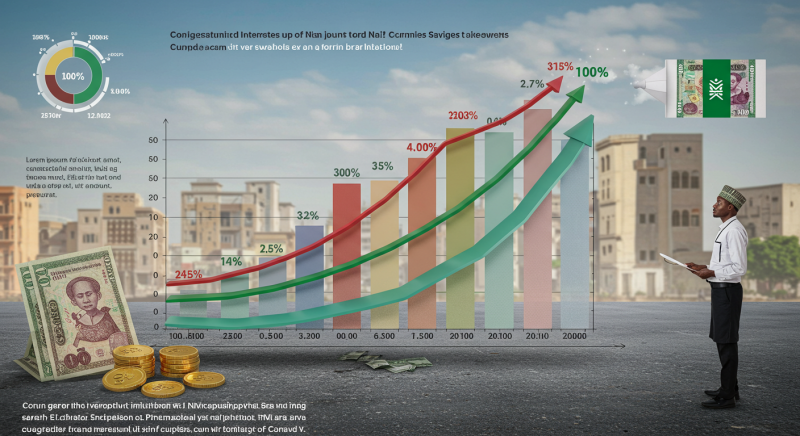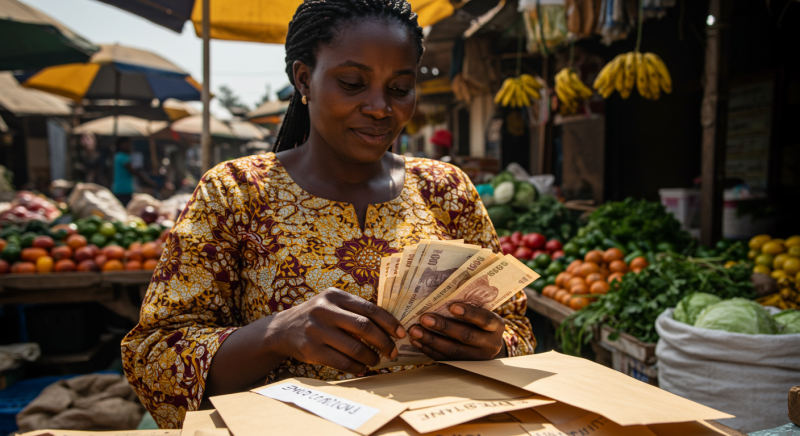In the bustling streets of Lagos, Abuja, or Port Harcourt, a quiet revolution is taking place—one naira at a time. Nigerians are discovering that saving money in Nigeria isn’t just a dream but an achievable reality with the right approach.
I’ll never forget watching my grandmother carefully fold worn naira notes into her small wooden box beneath her bed. “Small drops of water make a mighty ocean,” she’d say with a knowing smile. Years later, her wisdom rings true as millions of Nigerians navigate an economy characterized by inflation, currency fluctuations, and economic uncertainties.
Saving money in Nigeria requires more than just willpower—it demands strategic planning, disciplined execution, and creative approaches tailored to Nigeria’s unique economic landscape. Whether you’re trying to build an emergency fund, save for a major purchase, or secure your retirement, this comprehensive guide will provide you with practical, actionable strategies that work specifically in the Nigerian context.
Key Takeaways:
- Successful saving money in Nigeria requires both traditional and innovative approaches
- Automating savings is crucial for consistency in the Nigerian economic environment
- Local savings groups like “ajo” and “esusu” remain relevant modern financial tools
- Side hustles aligned with your skills can significantly boost your savings potential
- Financial literacy is the foundation for effective saving money in Nigeria
- Technology offers new opportunities for savings through fintech apps and platforms

The Current State of Savings in Nigeria
Before diving into strategies for saving money in Nigeria, it’s important to understand the current financial landscape. According to the National Bureau of Statistics, only about 40% of Nigerian adults have formal savings accounts, while inflation reached 22.41% as of March 2025, putting additional pressure on savings efforts.
The Global Findex Database reports that only about 30% of Nigerian adults save regularly, compared to a global average of 48%. This savings gap represents both a challenge and an opportunity for Nigerians looking to secure their financial future.
Traditional Savings Methods Still Work
Saving money in Nigeria often begins with approaches that have stood the test of time:
Kolo (Piggy Bank) System with a Modern Twist
The traditional “kolo” or piggy bank system remains an effective way of saving money in Nigeria, especially when you modernize the approach. Rather than using clay pots as our grandparents did, consider dedicating a specific container for loose change and small denomination notes.
Challenge yourself to put aside a fixed amount daily—perhaps ₦500 or ₦1,000. What makes this approach powerful is its tangibility; physically seeing your money accumulate creates a psychological satisfaction that digital savings sometimes lack.
One Lagos-based salesman I interviewed has purchased three plots of land using this method over five years. “I simply refused to spend any ₦500 notes that came my way,” he explained. “Before I knew it, I had enough for my first land purchase.”
Leveraging Community Savings Groups
“Ajo,” “esusu,” or “adashe” (depending on your region) remains one of Nigeria’s most enduring financial practices. These rotating savings groups work on a simple premise: members contribute a fixed amount regularly, and each member takes the full collection in turns.
Beyond the financial benefit, these groups provide social accountability that makes saving money in Nigeria more sustainable. The fear of letting down your community members creates a powerful incentive to maintain your savings discipline.
According to a study by EFInA (Enhancing Financial Innovation & Access), approximately 60% of adult Nigerians participate in some form of informal savings group, demonstrating their continued relevance in modern financial planning.
Modern Approaches to Saving Money in Nigeria
Automate Your Savings Process
One of the most effective strategies for saving money in Nigeria is removing yourself from the equation through automation. Most Nigerian banks now offer standing order services that automatically transfer a designated amount from your main account to a savings account on payday.
Platforms like PiggyVest, Cowrywise, and Bamboo have revolutionized automated savings in Nigeria by offering features like:
- Fixed automatic withdrawals on specified dates
- “Save as you spend” options that round up transactions and save the difference
- Lock savings features that impose withdrawal restrictions to prevent impulsive spending
A study by the Central Bank of Nigeria found that individuals who automate their savings are 73% more likely to achieve their financial goals compared to those who attempt to save manually.
The 50-30-20 Rule Adapted for Nigeria
While the 50-30-20 budgeting rule (50% for needs, 30% for wants, and 20% for savings) works in many economies, the Nigerian reality often requires adaptation. Given the economic pressures, many financial advisors recommend a modified approach for saving money in Nigeria:
- 60% for needs (accommodation, food, transportation, and utilities)
- 20% for wants (entertainment, eating out, etc.)
- 20% for savings and debt repayment
Tosin Olaseinde, founder of Money Africa, suggests that “saving money in Nigeria requires realistic goals. Starting with even 5% of your income is better than nothing, and you can gradually increase this percentage as your financial discipline improves.”
Embrace the Power of Multiple Income Streams
In Nigeria’s challenging economic environment, relying solely on one income source often limits your saving potential. Developing side hustles aligned with your skills and market demands can significantly boost your capacity for saving money in Nigeria.
Popular side hustles include:
- Digital skills (content creation, graphic design, programming)
- E-commerce and dropshipping
- Agricultural investments (crop farming, livestock)
- Transportation services
- Tutoring in specialized subjects
According to a 2024 survey by the Lagos Business School, Nigerians with multiple income streams save an average of 27% more than those dependent on a single source of income.

Practical Day-to-Day Savings Tips
Master the Art of Negotiation
The ability to negotiate is crucial for saving money in Nigeria. From market purchases to rent agreements, developing strong negotiation skills can significantly reduce your expenses. Nigerian markets expect haggling, so embrace this cultural practice to stretch your naira further.
“Never accept the first price in Nigerian markets,” advises financial blogger Feyi Olubodun. “Starting your counteroffer at 40-50% below the asking price often leads to a final price that’s 15-30% cheaper than the original.”
Embrace Bulk Buying—Strategically
Bulk purchasing is a powerful strategy for saving money in Nigeria, particularly for non-perishable items like toiletries, cleaning supplies, and certain food staples. Markets like Mile 12 in Lagos or Utako in Abuja offer significant discounts for wholesale purchases.
However, calculate the per-unit cost before committing to bulk purchases, as not all bulk deals represent actual savings. Additionally, consider forming buying groups with friends or neighbors to access wholesale prices without exceeding your storage capacity.
Leverage Technology for Price Comparisons
Before making significant purchases, use price comparison websites and apps to ensure you’re getting the best deal. Platforms like PriceCheck Nigeria and Jumia allow you to compare prices across multiple vendors, supporting your saving money in Nigeria goals.
Planning for the Future
Emergency Fund First, Then Investments
Financial experts unanimously agree that before pursuing other financial goals, establishing an emergency fund is crucial for saving money in Nigeria. Aim to accumulate three to six months of essential expenses in a readily accessible account.
Once your emergency fund is established, explore investment opportunities to protect your savings from inflation. Options include:
- Treasury bills and government bonds
- Mutual funds
- High-yield savings accounts
- Real estate investment trusts (REITs)
- Stocks (through platforms like Bamboo or Trove)
Invest in Financial Literacy
Perhaps the most valuable investment for saving money in Nigeria is in your financial education. Resources like the Central Bank of Nigeria’s financial literacy programs, online courses, and personal finance books tailored to the Nigerian context can transform your relationship with money.
According to research by the Financial Literacy Coalition of Nigeria, individuals with higher financial literacy scores save an average of 32% more than their peers, regardless of income level.
“What most Nigerians don’t realize is that saving money in Nigeria is less about how much you earn and more about understanding financial principles,” explains Dr. Femi Adeyemi, an economist at the University of Lagos. “I’ve seen janitors with better savings habits than some executives because they invested time in understanding money management.”
Overcoming Cultural Barriers to Saving
Navigate Family Financial Expectations
In Nigeria’s collective culture, family financial obligations can significantly impact your ability to save. While supporting family is important, establishing clear boundaries is essential for saving money in Nigeria.
Consider implementing these strategies:
- Create a specific “family support” budget category with clear limits
- Focus on empowering family members through education and skill development rather than regular financial support
- Have open conversations about your financial goals and limitations
Resist Social Pressure and “Keeping Up Appearances”
The culture of “keeping up appearances” or “packaging” can derail even the most disciplined saving plans. Resisting social pressure to maintain a certain lifestyle is crucial for saving money in Nigeria.
“I had to make a conscious decision to live below my means,” shares Funke Akowedo, a project manager who saved enough to start her business within three years. “My colleagues were driving fancy cars while I took public transport. Today, I own my company while many of them are still managing car loans.”
Conclusion: The Long Road to Financial Freedom
Saving money in Nigeria isn’t just about denying yourself pleasures today—it’s about creating possibilities for tomorrow. By combining traditional wisdom with modern approaches, anyone can build financial security despite economic challenges.
Remember that saving is a marathon, not a sprint. Start with small, consistent habits, gradually building toward your financial goals. As the Nigerian proverb says, “Little by little, the bird builds its nest.”
The strategies outlined in this guide are not merely theoretical—they’re proven approaches that have helped thousands of Nigerians transform their financial futures. By adapting these principles to your unique situation and remaining disciplined in their application, you too can master the art of saving money in Nigeria.

Frequently Asked Questions
What percentage of income should I be saving in Nigeria?
Financial experts recommend saving at least 20% of your income. However, given Nigeria’s economic realities, start with whatever percentage is realistic for you—even 5% is better than nothing. Gradually increase this amount as your income grows or expenses decrease.
How can I save money when my income barely covers my needs?
Start by conducting a thorough review of your expenses to identify non-essential spending. Consider downgrading certain services, finding more affordable accommodation, or developing additional income streams. Even small amounts saved consistently add up over time.
Are digital savings platforms safe in Nigeria?
Most established digital savings platforms in Nigeria are regulated by the Central Bank of Nigeria and employ robust security measures. Research any platform before using it, ensuring they have proper licensing and positive user reviews. Platforms like PiggyVest, Cowrywise, and Kuda Bank have established track records of reliability.
How can I save for my children’s education in Nigeria’s inflationary environment?
Consider education-specific savings plans offered by various financial institutions. Additionally, explore dollar-denominated investments to hedge against naira depreciation. Starting early is crucial, as the power of compound interest can help overcome inflationary pressures over time.
What’s the best approach to saving for retirement in Nigeria?
Diversification is key for retirement savings in Nigeria. Consider contributing to the National Pension Scheme, investing in income-generating real estate, building a portfolio of stocks and bonds, and exploring dollar-denominated investments to protect against currency fluctuations.
READ MORE
Comprehensive UK Visa Guide for Nigerian student
